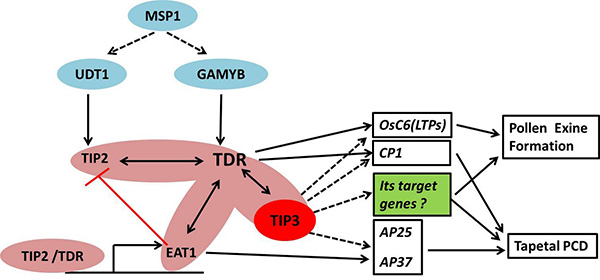






Discovery of a new member of rice male sterility genes——TIP3, regulating Ubisch bodies and pollen wall formation in rice
June 19th, 2019
Male reproductive development involves a complex series of biological events and precise transcriptional regulation is essential for this biological process in flowering plants. Several transcriptional factors have been reported to regulate tapetum and pollen development; however, the transcriptional mechanism underlying Ubisch bodies and pollen wall formation remains less understood. Recently, researchers from China National Rice Research Institute (CNRRI) of Chinese Academy of Agricultural Sciences (CAAS) have published their research results entitled “TDR INTERACTING PROTEIN 3, encoding a PHD-finger transcription factor, regulates Ubisch bodies and pollen wall formation in rice” on The Plant Journal. This work reveals an unprecedented role of a conserved PHD-finger protein, TIP3, functioning as a transcription factor with transcriptional activation activity to regulate Ubisch bodies pollen exine formation in rice.

The proposed model of TIP3 in tapetal PCD and pollen exine formation.
Researchers isolated a male sterility mutant of TDR INTERACTION PROTEIN 3 (TIP3), which displays smaller and pale yellow anthers without mature pollen grains, abnormal Ubisch body morphology, no pollen wall formation as well as delayed tapetum degeneration, from a 60Coγ-ray radiation-induced population derived from indica rice cv. Zhonghui8015 (Zh8015). Map-based cloning confirmed that TIP3 encodes a conserved PHD-finger protein and further study confirmed that TIP3 functioned as a transcription factor with transcriptional activation activity. TIP3 is preferentially expressed in the tapetum and microspores during anther development. Moreover, TIP3 can physically interact with TDR, a key component of the transcriptional cascade in regulating tapetum development and pollen wall formation. Furthermore, disruption of TIP3 changed the expression of several genes involved in tapetum development and degradation, biosynthesis and transport of lipid monomers of sporopollenin in tip3 mutant. Taken together, all these results demonstrated a critical role of TIP3 in rice reproductive development and also presented a potential tool to manipulate male fertility for hybrid rice breeding.
This work was supported by grants from the National Key Transform Program (#2016ZX08001-002), the National Natural Science Foundation of China (#31521064 and #31801440), the Zhejiang Provincial Natural Science Foundation of China (#LQ17C130003), Independent Research subject of the State Key Laboratory of Rice Biology (#2017ZZKT10202) and the Super Rice Breeding Innovation Team and Rice Heterosis Mechanism Research Innovation Team of the Chinese Academy of Agricultural Sciences Innovation Project (CAAS-ASTIP-2013-CNRRI). More information can be found through the following link: https://onlinelibrary.wiley.com/doi/10.1111/tpj.14365.
CNRRI Today
Copyright © 2014- China National Rice Research Institute